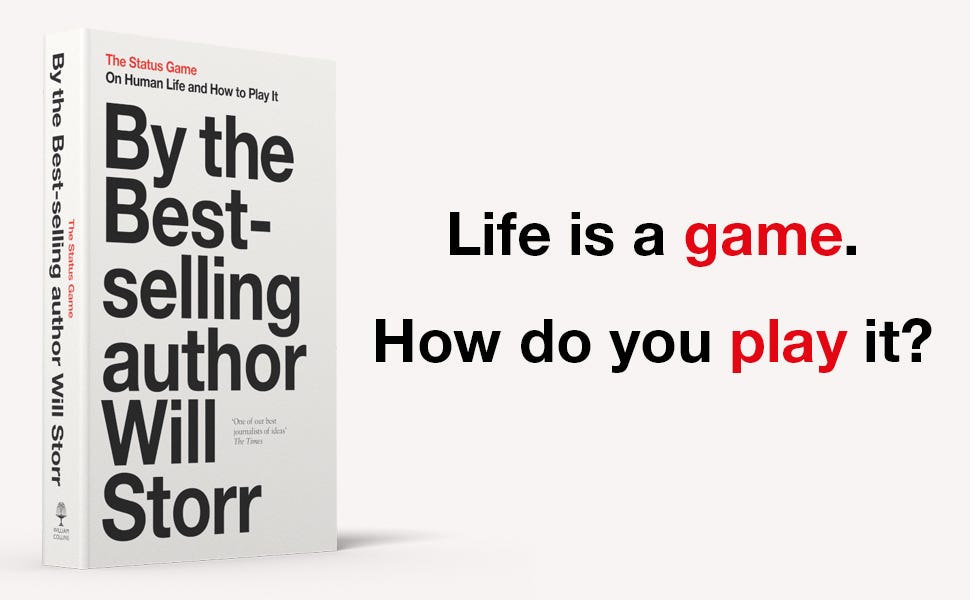On Becoming Nobody in the Age of AI
Learning to let go of the skills and abilities that made me special. And focusing on what AI cannot take away from any of us.
You know how beautiful women (and some men) talk about the pressures of beauty and fame? How, from a young age, they were sexualized or otherwise valued for their looks? And how many celebrities and ordinary people alike have to deal with that complex for much of their life? They talk about struggling with beauty standards, self image, eating disorders, and all that stuff.
I just realized that I had the same thing, but for intellect.
Those celebrities and other beautiful people have developed what Jung might have called a “beauty complex.” For me it was a “genius complex.” I know, many in my audience will be like “Yeah Dave, we knew.” I am pretty transparent and fame holds up a very large mirror to you. But let me unpack what I mean.
I was always complimented on my wit growing up. Once at the beach I was describing to an older man how the stormy ocean had bowled over a seabird. He thought I was much older than I was, given my vocabulary. Another instance, I was asking my aunt “Why does fire glow?” and she said “Because it’s hot!” which is accurate. I pressed on, “Yes, but why does that make it glow?” She didn’t know. I was not yet in kindergarten when I asked that question.
A bit later on, as a pre-teen, I’d become interested in car stereos (they were all the rage in my schools, you weren’t cool unless you had subwoofers that cause mild atrial fibrillation). So when we were visiting my older cousins and they were talking shop, I was like “Oh, you need a crossover for that.” And my cousin stops, looks at me, and just declares, “You know a little bit about everything, don’t you?” After hearing such responses my whole life, I was pretty proud.
But looking back, there’s this weird thing that happens when people realize how smart you are.
They just stop talking to you. They clam up, they stop asking you questions, and they freeze you out.
Adults. Teachers. Peers.
I’m still not entirely sure what it is, but it’s happened into adulthood. When I worked at Cisco Systems, I went all in on automation and that’s where my career really took off. Global scale problems, millions of dollars on the line. The senior architect on my team, a somewhat brash guy from New York with half a dozen nicknames including Rafiki (yeah, the dude from Lion King) kept giving me more and more automation projects. Eventually, I’d puppeted most of our five data centers across the Americas region. One day, he came to me with a problem he couldn’t solve—a rare occurrence because this guy was sharp. I mean, he was a towering tech whiz who very much deserved his title of TL (Technical Leader). That was basically the highest rank of individual contributor you could get in Cisco.
Anyways, he came to me with some sort of problem, we needed to automatically dig into the kernels of all our hosts and blah blah blah, but anyways, the point was that I got excited about this and figured it out, on the spot, and his eyes just sort of got wider and wider until he said “Okay… so you got it” and walked away. After that, I became Public Enemy #1 in his eyes. I was now a threat to his intelligence. He started giving me bullshit work, setting me up to fail, and freezing me out. Textbook narcissist move. I just loved automating stuff and I was getting good at it. Unfortunately for me, we’d also just gotten a new boss who was somewhat dimwitted and easily manipulated.
Ever since then, my intelligence has still gotten me into trouble. Because my life had some rough patches—parents divorced when I was six, mom died when I was fourteen—I didn’t really believe I was all that intelligent. I was a C-B student because I didn’t really care or try that hard, and the first subject I came across that really challenged me was math, but I was so unfamiliar with the sensation of being intellectually challenged that I thought I hated math. It was not until my late 20’s, when I was doing all that automation work, that I realized “Wait, this feels like when I was doing math… and I actually like it!?”
It took me a while to come up with the mantra “Don’t scare the tippies!” Tippie means “neurotypical” as in, those who are not ADHD, gifted, and autistic. The Triple Crown. Basically, this rule means that I need to titrate the full force of my abilities in certain company.
The point here is that my livelihood and my identity have been tied to intelligence for as long as I can remember. And, like beautiful people, it’s not been a unidimensional bed of roses. Some people love and hate those who are beautiful, and intelligence is no different. My startup cofounder kept calling me “Tony Stark” and when I put down boundaries, he freaked out and nuked the company. It imploded after I left.

Now, AI is nullifying any advantages I might have had.
Somewhere deep in the recesses of my brain, I knew this was coming. It’s why I couldn’t bring myself to keep doing any coding challenges or tutorials on YouTube. Why bother investing in something that will be irrelevant within a year or two?
Human brains are minmaxers for value, always trying to optimize energetic return on investment, and we do the best we can based on our cognitive time horizon. Since I’ve been immersed in GPT since 2020, my intuitive time horizon here is pretty long, and I saw the writing on the wall a while back; coding will become irrelevant, so don’t invest any more points into that skill tree.
I am awake late again. As I write this post, at 3:39AM, I realize that I did the same last night. My wife and I call these “high growth phases” wherein our brains are integrating some new profound truth—sometimes it’s about recovering from shitty childhoods—but in this recent episode, it’s been about orienting towards this new world we’re stepping into. Last night, I wrote my piece The River and the Garden.
The River and the Garden
Life can be approached either as a rushing river that carries you quickly from one milestone to the next with clear boundaries and an inevitable end, or as a garden that evolves gradually, allows for constant cultivation, and has no final form. While the river mentality focuses on completing sequential missions and reaching defined goals (like education, career, marriage), the garden approach embraces a slower pace of growth, accepts cycles of change, and allows for creative exploration without a fixed destination. This shift in mindset becomes especially relevant as we face potential technological changes that could drastically extend human lifespans and remove many of life's traditional constraints.
I just woke up from a series of dreams that all orbited around a theme, and when that happens, I know some serious integration is happening. Hence why I got out of bed to write.
In one dream, I was newly homeless, and my name was now “Duffel Dave” because I lived out of a big black duffel bag. I remembered being smart and successful, but now I was humbly living on the streets and just getting by. In another dream, I was trying to join the Navy Reserves at my advanced age, and fumbling badly beside the much younger recruits.
I woke up and quickly realized, my deeper psyche is asking me “What would it be like to become nobody?”
Yikes.
After becoming mildly famous, parlaying my intellect on the internet to gain a new career and sense of success, that’s basically my worst nightmare. I finally got the validation from strangers online that I was as smart as my family always said I was, and just in time for all that genius to mean precisely nothing! AI can write better than me, at least at the prose level. AI can solve math that I can’t even comprehend. AI knows more about history, philosophy, chemistry, and computer science than I’ll ever know. And not only that, it’s still accelerating!
I imagine these kinds of thoughts might keep some people up at night.
At the time of writing, I have a tweet going viral about how, by the end of this year, AI will have “solved” coding, as in, the top coders in the world will all be AI. This excites many people, but it enrages plenty more. I predictably had people lashing out at me in the comments, raging about how I’m delusional and yadda yadda yadda yadda.
If your self esteem is still predicated upon some skill, such as coding, that AI is rapidly overtaking, that’s not just a threat to your livelihood (which is bad enough) but also a status threat. Just like the architect on my team at Cisco—as soon as there was any evidence that he was not alone at the top he became vicious.
At the end of the day, we are little more than hairless chimps. Social status is the prime meta-signal that our ape brains pay attention to in order to assess our self-worth and our position in the pecking order.

Fortunately, I made the transition from “engineer” to “thinker and communicator.” It still surprises me how much of my audience actually disagrees with me, but they like the way I present my arguments so they keep watching. It’s only about 20% of my audience, but I do have some very loyal followers, and even colleagues, who disagree with a lot of what I say. As they say “It’s not what you say, it’s how you say it.”
Somewhere deep in my mind, perhaps because of my Ayahuasca trip at the beginning of December, my spirit is moving and saying “Hey, Dave. Maybe consider what’s going on, what if, just for the sake of argument, you lost everything you ever were to AI? Or just in general?”
What would be left if I was nobody? I don’t have a single economically valuable skill, at least not in the traditional sense. My coding skills are rusted through, and I can’t stand the minutiae of technology anymore. I’m a decent enough writer and communicator, but who isn’t? I have some social status to bank on, such as follower counts, subscribers, and the various communities I curate. And, honestly, until recently, I was confused about this. Why do people follow me? Why do people want to be near me? It’s very strange, especially considering how much of a dork I was all through school.
What value do I add to the world?
There are two primary ways we can think about life—from the outside in, and from the inside out. From the outside, I’m a YouTuber and former technologist who talks about AI and philosophy. I once asked Perplexity “Who is David Shapiro on YouTube and what makes him famous?” I honestly had no idea what it would come back with.
David Shapiro’s ability to communicate complex ideas about AI, technology, and their societal implications in an engaging and accessible manner has contributed significantly to his fame on YouTube. His content appeals to those interested in understanding the future of technology and its impact on human life.
This was not an exercise in ego, I genuinely did not know. But most people cannot ask an AI search engine “What is my source of self esteem? Why do people care that I exist?” Maybe soon, though. Once we all have AI agents in our pockets, keeping tabs on all our relationships even if we’re not internet-famous.
From the inside perspective, I’m quite different.
I mostly spend my days reading, writing, thinking, playing with my dogs, going on walks, and talking with my wife. I’m fairly grounded, actually. My wife and I get breakfast at the same diner every morning, we take our dogs to the dog park at least once a day, weather permitting, and we travel every now and then. I’m still recovering from chronic health issues, so I’m more constrained than I’d like to be, and some days are still a struggle, though fortunately those days are further and further apart.
Sometimes people jokingly ask me “So what jobs are going to be around? Influencers?” I’ve spent some time trying to figure this out, and I’ve done a lot of work in this area. But honestly, it’s easier to predict what jobs are on the chopping block than what will remain. In hindsight, it will feel totally obvious like “Oh yeah, that job was never going anywhere.” There will likely be new jobs too. If you’d told me ten years ago “You’ll make all your money from being an influencer, writing blog posts, and making slide deck YouTube videos” I would not have believed you.
I don’t have any answers.
At least, not any satisfying answers. I pivoted hard, and pivoted early, and managed to have good enough intuition for (now). But this night, I’m asking myself what else I can let go of? What if we’re all becoming nobody? What if we always were nobody? Sam Altman was just at a conference in Germany saying that GPT-5 will be much smarter than him, and it seems like it’s coming this year. So what makes us special anymore? Just the fact that we are vestigial organisms that have bootstrapped a superior race?
Or is it the simple joys of breakfast with your wife and your dogs chasing each other at the park? Sometimes, for me, it’s just the beauty of the river in the fall.






If we are intelligent enough I trust we will build a new story for being human that returns us to being the vehicles that allow the universe to experience itself subjectively. Sometimes that’s simple as watching a waterfall and feeling grateful as you describe.
That would require an ongoing ‘quest’ to silence the monkey mind and appreciate what we achieved in the striving stage of humanity.
I do think many will struggle to adapt to- there may be an entire industry right there
I worked hard in customer service for a decade after graduating college. I didn't ever get a job in design, where I thought I was meant to be. Then, in early 2020 I started working at Shopify in support. It was grueling for me, but I quickly climbed that ladder up, until I was working in a decently important technical support role. I felt so important and I was solving/diagnosing/triaging technical.issues I would have never dreamt I could comprehend. I always denied my intelligence, instead relying on my creativity.
Soon after, I was diagnosed with Adhd (and likely mold autism). I burnt out on the job, the layoffs, the working from a desk at home.
Now, I am happily working an entry level labour job for a local arborist. I'm learning everyday, and applying my intelligence and creativity while getting the outdoor and physical time I need.
Being a nobody feel alright.